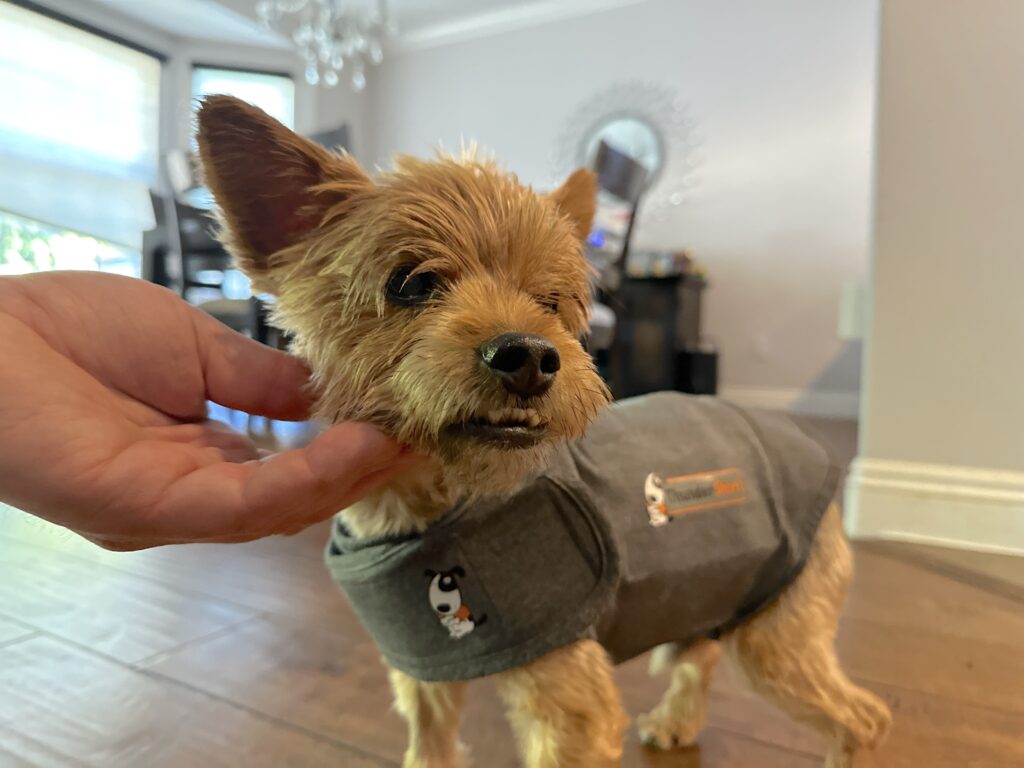Help an Older Dog Recover From a Benign Tumor
By: David Codr
Published Date: April 8, 2024
For this Santa Monica dog behavior session, we help 14 year-old Yorkie Gobi who is recovering from a benign Meningioma (brain tumor); sharing tips to help an older dog with his quality of life.
Gobi’s treatment left him mostly blind (We hope his eyesight returns), and due to being 14, his hearing isn’t what it once was. At this point, the loving people in his life are doing all they can to help him recover by providing him support, love and comfort. I felt honored to be invited to assist the family with this West LA in home dog behavior session.
No one wants to see their dog suffer, and watching our faithful companions slow down in the fall of their life can be difficult for everyone. However I was inspired by the love and dedication Gobi’s humans display on a daily basis. Ignoring the challenges that have come from his health problem and instead focusing on providing comfort to an older dog.
At the midpoint of this session, I visited his guardian’s bedroom and saw she had created a makeshift sleep area on the floor next to her bed so she could be near him while he paced at night. While we often sacrifice for those we love when they are in need, I reminded the humans it’s important to take some care of and time for themselves as well. No one can support another when we are so drained we are falling down ourselves.
It was almost as if Gobi understood that I was there to help his people too, as he went to his dog bed and laid down to sleep for nearly 2 hours. His guardians said this was unusual and something he only does with medication these days! Not sure why it happened, but was so happy to be there for any rest and comfort this tender little guy could get.
Assisting an older dog in any way you can is great, but bringing them comfort is obviously a top priority. I could see that his sleeping brought his family a great deal of comfort and a brief reprise. We took advantage of the situation and I was motivated to provide as many tips as possible.
Of course, we spent time discussing quality of life and the things to watch for, but Gobi’s guardians wanted to focus on helping him in the now. So we launched into a lengthy discussion of tips and tricks to help bring comfort to an older dog. I knew I was going to cover a lot of ground and pulled out my camera so the guardians could have a video filled with tips to help an older dog recover from a health issue.
Tips to Help an Older Dog with Quality of Life
Since Gobi’s condition has resulted in quite a bit of pacing, even in the night, I recommend his guardian return to her bed. This will give him more area to walk while also allowing her to get better quality rest.
I suggested they purchase some foam pool noodles to line the walls to provide him with consistent cushion in case he bumps into them.
The guardians knew to leave things in place as much as possible. Blind dogs often map out their home mentally and can be quite adept at navigating around the things when they know where they are. I mentioned they may want to use a Halo, a device blind dogs can use similar to a walking cane for humans who cannot see. However they had already tried to introduce one and Gobi resisted. This is fine as a tool designed to support can only be beneficial if the user finds it helpful. In Gobi’s case, it didnt help.
Due to his pacing at night, I recommended the guardian introduce belly bands overnight. His guardian was worried he would have an accident and step or slip in it in the night. Since his urination occurred in multiple attempts small in volume, a belly band can contain his urine overnight.
I suggested introducing a lick mat which can help provide an alternative form of stimulation. When one sense is diminished or taken away, many people find their other senses become heightened. I was hopeful that may be the case for sweet Gobi as well. Additionally, mental stimulation can be a welcome distraction while the feel good endorphins released when dogs lick and chew can also have benefits.
Another tip to help senior dogs is to provide literal (physical) support. I suggested they find a pillow that Gobi can rest his torso on as he eats. While his guardian dutifully helps hold him for meals, I always try to find ways to help the animal help themselves. No one likes being dependent on others, dogs can have similar feelings. Finding a pillow that is sized just right to all him to rest his chest and torso on while keeping his paws on the floor can assist in this way.
Im hopeful that the pacing will continue to diminish, but if it remains chronic, the guardians may want to look into a dog support roller. There are several versions of this doggy wheel chair. The dog’s paws still reach the ground, but by reducing some of the weight we can literally lighten his load.
I also suggested treat trails in straight lines or right circles or curves. All of his pacing was to the left which I believe to be neurological. The vet staff had not yet discussed that with them, so this may be something not behavior related. But if it isnt , straight lines or gradual right circles may help break the pattern. If not, no need to add the circles or curves.
There were a number of other life hacks to assist older dogs that were too numerous to catalog here. Instead I set up my camera so I could record a video of tips to assist senior dogs. If you have an elderly dog, you may want to check out the free dog video below. I hope some of the advice I shared with Gobi’s family can help you and your dog if he or she is in need.
We wrapped things up by discussing some questions for the family to bring to their medical team. I am concerned Gobi may have urinary stones due to his multiple urination attempts each bowl movement. I think they should also discuss the neurological impact of his condition as all of his pacing is to the left. The more they know about common side effects and the long term impact of the radiation and medical condition the better they can make decisions on the tips we discussed that will do him the most good.
I asked the guardians to follow up with me if they have any questions on what we covered or how we can adjust them following their next consult with their veterinary staff. I hope this session helped provide the guidance and support they needed as they help their precious Gobi recover from his medical episode so that he can have the best life possible for as long as he wants to be here.
Need Help With Your Dog's Behavior, Request a Quote TodayCategorized in: Dog Behavior


